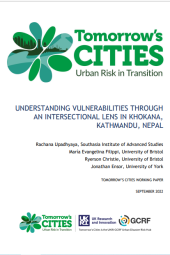Understanding Vulnerabilities Through an Intersectional Lens in Khokana, Kathmandu, Nepal
Summary
The document is part of the Tomorrow's Cities research and the UKRI GCRF Urban Disaster Risk Hub, focusing on cross-city social sciences inquiry about vulnerabilities and capacities. The document contains the analysis of the case study of Ward No. 21 in Khokana, Nepal, to understand the cultural, social, and political roots of vulnerability among individuals and different social groups. Nepal faces high climate and earthquake risks, making it one of the most vulnerable countries globally. The study emphasizes the shift from studying disasters as natural phenomena to recognizing them as social and political, leading to the concept of social vulnerability. Nepal's new Constitution and recent legislation and policies address gender equity and social inclusion (GESI) in disaster situations, aiming to include marginalized groups in policies and programs.
The document proposes an intersectional understanding of vulnerability, recognizing the dynamic and complex nature of vulnerability that cannot be captured solely by predetermined socio-demographic categories. It discusses the research design, methodology, and ethical considerations. The case study of Khokana is introduced, considering the context and particularities of the community. The analysis focuses on vulnerabilities at two levels: policy discourse and the experiences of residents in Khokana. It highlights the need to broaden the understanding of vulnerability through an intersectional lens, recognizing how different identity categories intersect to produce differential marginalization in post-disaster recovery and reconstruction. The document concludes with policy recommendations to introduce an intersectional analysis of vulnerabilities in disaster risk reduction initiatives, considering individual social locations and histories.
Categories:
Case Studies
Writer:
Rachana Upadhyaya, María Evangelina Filippi, Ryerson Christie, Jonathan Ensor
Publisher:
Tomorrow's Cities Working Paper
Published Year:
2022
